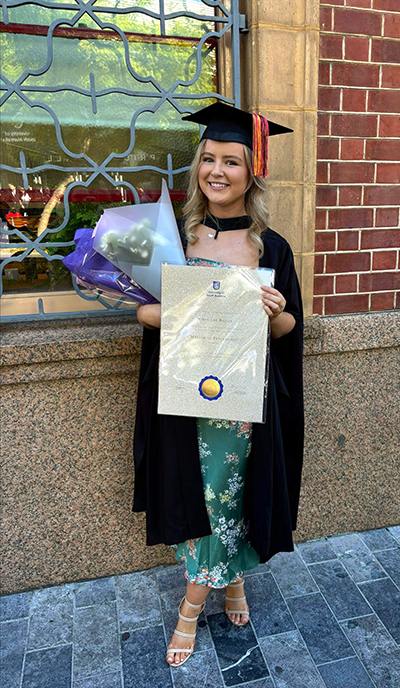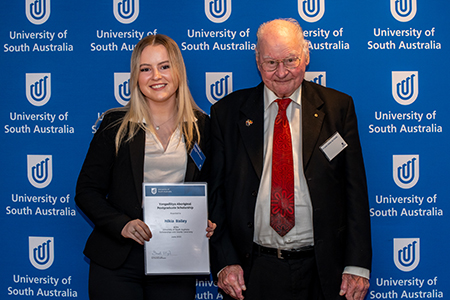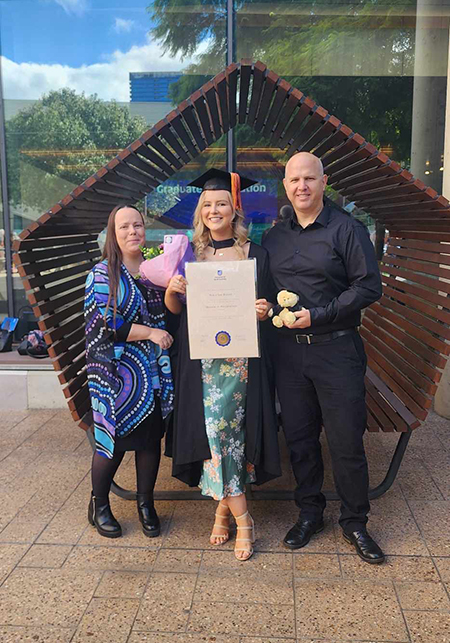02 September 2024
Nurturing potential and dismantling barriers: The transformative power of Aboriginal scholarships

Nikia is a proud Ngarrindjeri woman, new UniSA Master of Psychology (Clinical) and aspiring clinical psychologist. She has big ambitions to transform the wellbeing of rural Aboriginal young people through greater access to culturally safe mental health support. Her story illustrates the life-changing possibilities that come from dismantling barriers to higher education – not only for individual students but entire communities.
Nikia's path to clinical psychology began at a UniSA careers expo. Fifteen at the time and weighing up her career options, she already had an interest in health sciences, inspired by her mother studying occupational therapy, but it wasn’t until she read a pamphlet on allied health careers, she realised psychology was her calling.
"I remember thinking 'I really like the sound of that’,” she says.
“Growing up, I witnessed a lot of people struggling, living with mental health difficulties. So I’ve always been interested in the mental health landscape. I just hadn’t pictured myself working in that area. I also knew it was quite a difficult path to go down.”
When it came time to apply, Nikia was also accepted into the University of Adelaide Psychology Program but had her “heart set on UniSA” because both her parents had recently studied there as mature students.
“It was familiar and seemed the place I'd be most comfortable.”
However, like many First Nations students, the Adelaide High School student still found the transition to university presented challenges largely unfamiliar to her non-Aboriginal peers.
Aged just 17, and the first person in her family to finish high school, Nikia says she remembers “feeling so lost.”
“Even though my parents had returned to uni as mature students, it was a completely different process for them, they didn't know how to support me.”
Nikia also had to navigate a new system of learning and assessment often at odds with her lived experience – while at the same time feeling the isolation of being the only Aboriginal student in her cohort.
“I had to put in a lot more effort than some non-Aboriginal students to understand what assignments were asking of me. Another barrier is that what you're learning in psychology isn't Indigenised. So you need to ‘decolonise’ the information so you can fit it into your own framework of understanding.”
“We were drilled in cognitive and behavioural methods and frameworks, but these don’t fit the way Aboriginal people view the world.
“Aboriginal culture sees mental health as social and emotional wellbeing, with a holistic approach to viewing self. If one part of your social and emotional wellbeing is unbalanced – such as connection to country or culture – then other aspects of self are immediately impacted.
“You can’t heal the spirit without understanding the cultural components of life Aboriginal people value.”
UniSA’s support systems, particularly Wirringka Student Services, became Nikia's lifeline. These services, tailored to Aboriginal students, offered dedicated engagement officers, study centres, and tutoring, enabling her to thrive.
"I really benefited from those services and just felt supported at all times at UniSA."
“Without the support in place for Aboriginal students, I don’t think I would have been able to overcome the hurdles I faced,” she says.

Scholarship from Dr Uncle Lewis O'Brien AO FUniSA
Another absolutely critical support for Nikia were the scholarships she received that helped her financially through her six years of study.
This included the $5,000 Irene & David Davy Scholarship for Advancement of Aboriginal and Torres Strait Islander Education in 2020; a three-year GO Foundation Aboriginal Scholarship, worth $7,500 per year in 2020; and the $10,000 Yangadlitya Aboriginal Postgraduate Scholarship and $15,000 Dr Evelyn Scott Scholarship (awarded by the Bupa Foundation) in 2022, which supported Nikia through her Masters.
Without these, Nikia would not have been able to complete the bachelor’s degree, Honours year, and demanding master’s program – including three unpaid placements –necessary for becoming a clinical psychologist.
“I've been financially independent since I was 18. So I absolutely would not have been able to support myself throughout my studies without these scholarships, which I’m just so grateful for.
"Having financial support meant I didn't have to work 40 hours a week, which would not have been possible to manage at postgrad level.
“At the start of Honours, our lecturers warned us eight hours a week would be the most we could work without burning out. For my master’s, they said just don’t work – the studying and placements are a fulltime job.”
Throughout her studies, Nikia was patently aware of financial cost as a significant barrier for First Nations students, along with the cultural obstacles.
“I know so many other students who got part way through their course and just couldn’t continue because of the cost, or because they had been away from Country too long or had more cultural responsibilities than their non-Aboriginal peers. All of these things can really take a toll on mental wellbeing.
“I was a ball of anxiety about how I was going to afford to put myself through Masters. The relief I felt when I got the call about the Dr Evelyn Scott Scholarship was overwhelming. It was pretty life-changing, to be honest.”
Summer internships with Goodstart Early Learning, Frank Knight, and the headspace National Youth Mental Health Foundation further empowered Nikia, providing invaluable practical experience as well as instilling confidence. These were facilitated through UniSA’s partnership with CareerTrackers, ¬a national not-for-profit offering paid internships to Aboriginal university students.

“CareerTrackers was really beneficial for me and a big part of my undergraduate university experience.”
These internships not only provided foundational skills and networks for Nikia's path to becoming a clinical psychologist but also set Her apart in her master's application process.
“I applied for eight universities around Australia and got into seven, because I had so much real world experience.”
But UniSA was still the natural choice.
“I knew UniSA had a great master's program where they focused a lot on the practical elements, and that is really valued by future employers.”
Recognising the power of the support she received throughout her studies, Nikia was also dedicated to helping other Aboriginal students reach their full potential. These full-circle moments saw her return to Adelaide High School to mentor Aboriginal students –just as she was once mentored – and work with Wirringka Student Services to support two Aboriginal students starting their Master of Psychology (Clinical), just as she had a year prior.
“Mentoring and tutoring are so important for equity – for students to be able to meet the same level as their non-Aboriginal peers, whose parents, and even grandparents, have gone to university before them.”
“I worked with the master’s students because I felt it was something I could really help with. I would have loved that support myself, but there were no other Aboriginal students who had done their master’s recently before me.”
While Nikia grew up in the northern suburbs of Adelaide, she is driven by a desire to support Aboriginal people living in rural and remote areas – where rates of suicide and self-harm are higher than in major cities, but mental health services far less accessible.1
“I always knew I wanted to work with Aboriginal people. But more recently this has developed into wanting to work with those in rural and remote communities.”
“If someone wants an Aboriginal psychologist within a remote area, they either don't get the service or they have to come to a bigger city like Adelaide.”
Nikia says it was a pivotal moment for her to recognise that urgent need and "come to terms with the fact I could be the one to fill it”.
This article appeared in the 2023 Donor Impact Report and is an excerpt from a more extensive article.




